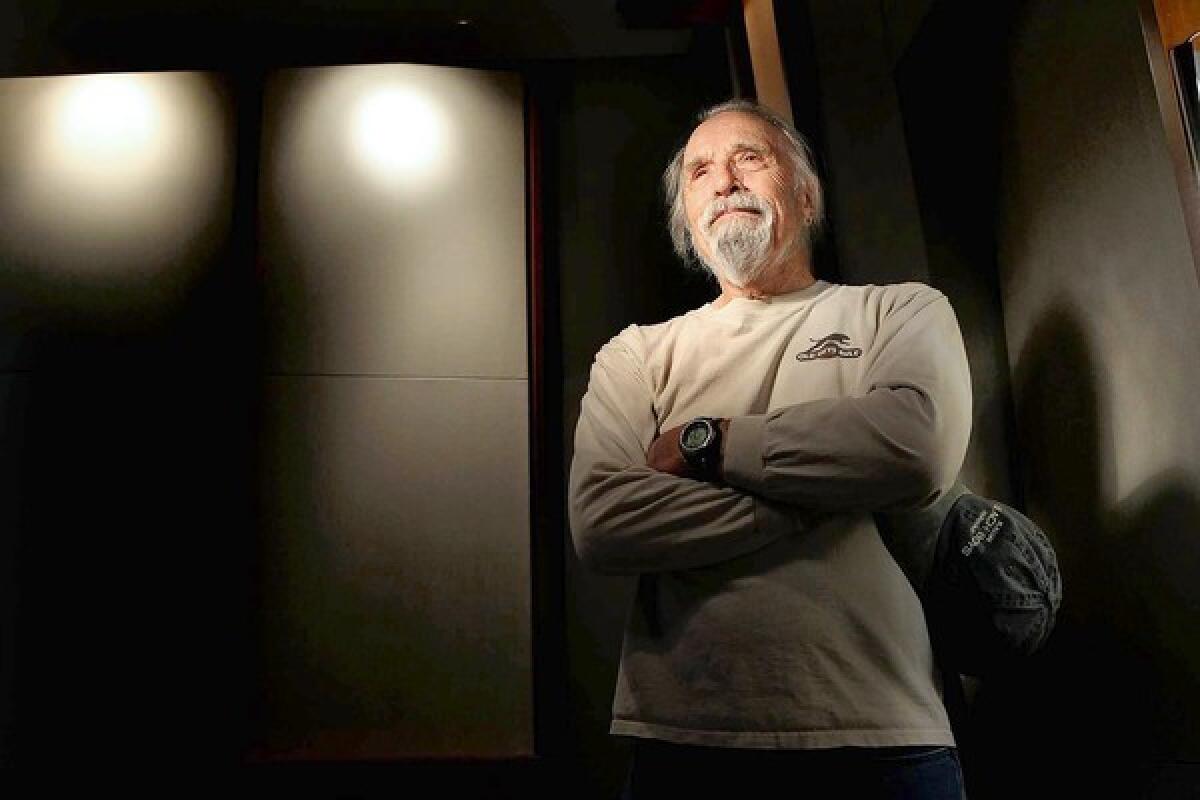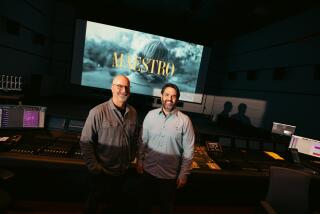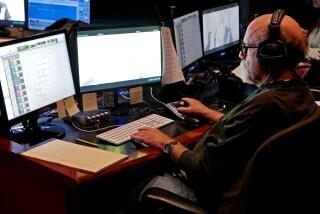It’s still music to Dan Wallin’s ears

- Share via
Just before noon on a clear fall day, the Newman stage on the 20th Century Fox lot is alive with bright lights, hovering microphones and a full 105-piece orchestra. It’s one of the final scoring sessions for “Mission: Impossible — Ghost Protocol,” and director Brad Bird and composer Michael Giacchino are listening closely to the music when a man with a snow-white ponytail and baseball cap leans over to whisper in Giacchino’s ear. The composer nods and asks the conductor, Tim Simonec, to take it from the top, with a shade less emphasis on the piano.
The white-haired man behind the sound console is Dan Wallin, or Danny as he is widely known. At 84, he is the oldest working sound engineer in the film industry, yet his ears still rank among the sharpest around, according to his colleagues. He recognizes, often before anyone else, if the trombones should be doubled, if the saxophone is too brassy, or whether the timpani need to be taken down a notch.
Despite Hollywood’s long-standing practice of ageism, Wallin has stretched his career over 60 years, working on more than 500 films and TV shows and recording the scores of such notable composers as Jerry Goldsmith, John Williams and Lalo Schifrin, creator of the music for the original “Mission: Impossible” TV series. He fine-tuned the car screeches and jazz-inspired score of “Bullitt,” mixed the wild saxophone sounds in John Cassavetes’ “Gloria” and was nominated for Oscars for “A Star Is Born” and “Woodstock” in the 1970s. More recently, he captured the ethereal score for all six seasons of TV’s “Lost” and won an Emmy as part of the sound mixing team for the 2009 Academy Awards show.
“I think at this point I probably have more mileage in than anybody,” the lanky engineer remarked over craft-services salads after a morning of scoring “Mission: Impossible.” He has been on the Fox lot since 7 a.m., choosing and placing dozens of microphones on the stage, testing equipment and making sure all is in order before the first violinist draws her bow.
“We do everything all at one time — the tracking, rhythm, brass, string,” Wallin says. “I prefer it, and the musicians prefer it too, because it’s more of a performance.”
It’s a tactic he has used since his days as a sound mixer at Warner Bros. in the 1950s and 1960s and one that many say gives his scores an added warmth.
“There is a tendency to put a lot of reverberation on film scores, and it tends to feel like it’s in a cathedral,” says Giacchino. “It’s massive, and you lose the identity of the different instruments that are going on in there. On a Dan Wallin score, you can hear every instrument that’s playing.”
The 44-year-old composer has hired Wallin to record and mix his scores for more than a dozen projects, including the video game Call of Duty and Pixar’s “The Incredibles.”
A scoring mixer’s job is to capture and improve the composer’s original music in the live atmosphere of a scoring stage. But the increased focus on sound effects and use of synthesizers and prerecorded music over costly live orchestras have changed the nature of the job in recent decades, notes Jay Palmer, former supervising sound engineer at Fox and now theater operations engineer for the Academy of Motion Picture Arts and Sciences.
“We younger guys, we’re tweakers,” he says. “We rely a lot on prerecorded tracks.” Wallin, he adds, is part of a vanishing breed that knows how to “set up 50 or 60 microphones and make a live orchestra sound good instantly.”
Wallin grew up during the Depression in a boys’ orphanage in Van Nuys. His mother, a sales clerk at the old Broadway department store, worried about him and his brother “running loose” on the streets of Hollywood, and she visited them on weekends. “It was a good life, no problems,” he says, and it was where he learned to play the drums and build his first pair of power amplifiers.
After serving in World War II as a Navy aviation radio operator, Wallin got a job broadcasting live band performances for CBS Radio. Among the many acts he captured live were Freddy Martin and his band at the Cocoanut Grove Ballroom in the Ambassador Hotel and a pre-television Lawrence Welk at the Aragon Ballroom.
“I got really good at mixing music, because when you’re live, you can’t make any mistakes,” he said. “If you do, boom, everybody in the world knows it.”
He joined Warner Bros. in 1965 as a music mixer at a double-scale salary and five-day-a-week guarantee, an “unheard-of” deal that still makes him chuckle. It was there that he recorded the scores for such films as “Cool Hand Luke” and “Who’s Afraid of Virginia Woolf?” and witnessed the elite studio orchestras of the mid-20th century.
“All those European players who had escaped Germany came to this country and began working in the studio orchestras,” he said. “They would play and you’d just get goose bumps.”
Back then, he recalled, the recording equipment “looked like an old roll-top desk with a couple of round knobs, a dozen vertical fitters and four equalizers.” Today, he is comfortable at the helm of a million-dollar analog recording console with 192 motorized faders and adept in Pro Tools, the popular audio technology software used in music scoring and mixing.
“He knows the technology, but he also knows that it all starts with the music,” says Armin Steiner, a Grammy-winning sound mixer whose film credits include “Revolutionary Road” and “Wall-E.” “He has the greatest understanding of an orchestra and how it relates to a film than anybody.”
Though laid-back by nature, Wallin is quick to bemoan the way the film business has changed over the years with its focus on blockbusters and sound effects. Although his film credits are dotted with lowbrow fare (“Date Movie,” “Harold and Kumar Go to White Castle),” his favorite flicks remain firmly in the pre-1980s era: “The Wild Bunch,” “Pat Garrett and Billy the Kid,” “Magnum Force.”
“It used to be the music was part of the story,” he says. “The credits read dialogue, music and sound effects. Now they read dialogue, effects and music, and that’s just so wrong. The emotion of the movie is the music when it’s written correctly.”
A few days after the Fox scoring session, Wallin is at Warner Bros., remixing the “Mission: Impossible” music that was recorded live the week before. The orchestra is gone, and only a handful of crew members are on hand.
Wallin adds more tambora drums and tones down the acoustic sitar on a complicated piece accompanying a scene in which stars Tom Cruise and Paula Patton attend a black-tie gala in a Mumbai mansion. “It’s strong, but it could be stronger,” he says.
On a break a few moments later, the octogenarian claims not to remember much about his long film career, but the stories tumble out with light prodding: the Cristal-fueled party after a long New Year’s Eve scoring session for “King Kong”; the thrill of meeting Fred Astaire while working on Francis Ford Coppola’s “Finian’s Rainbow”; towing equipment up to the old Angeles Gun Club near Hansen Dam to record shotgun blasts for director Sam Peckinpah in “The Wild Bunch.”
Peckinpah, Wallin says, was a “fiend” when it came to getting every sound right in his classic western. “If a girl came out with a little .22 or .35 automatic [in a scene], I had to have that exact caliber of gun,” he said. “Each gun had its own sound, and the caliber for that gun was accurate because we recorded every one of ‘em.”
Wallin sticks to post-production music scoring these days, leaving the dialogue, gunshots and other sounds to editors, designers and re-recording mixers, who also make up the labor-intensive process of a film’s sound. He speaks wistfully of his Warner Bros. days, when “you could bring your pants over to wardrobe and have them tailored [and] it was like a second home.” Now a film’s sound team, Wallin included, typically works freelance.
Yet except for the purchase of a programmable hearing aid a few years ago, the octogenarian shows no signs of slowing. He just wrapped “John Carter,” with Giacchino as composer, and scoring sessions for TV’s “Fringe” and “Alcatraz” are on the calendar for 2012.
His vague retirement plans include gutting and rewiring the 1950s beach house he just bought on Kauai and hanging out with his wife, Gay, four dogs and parrot at their hillside Malibu home.
But not just yet.
“I’m hoping it will be another two years,” he says. “I’d like to go out as a big gun and not end with a whimper.”
More to Read
Only good movies
Get the Indie Focus newsletter, Mark Olsen's weekly guide to the world of cinema.
You may occasionally receive promotional content from the Los Angeles Times.










